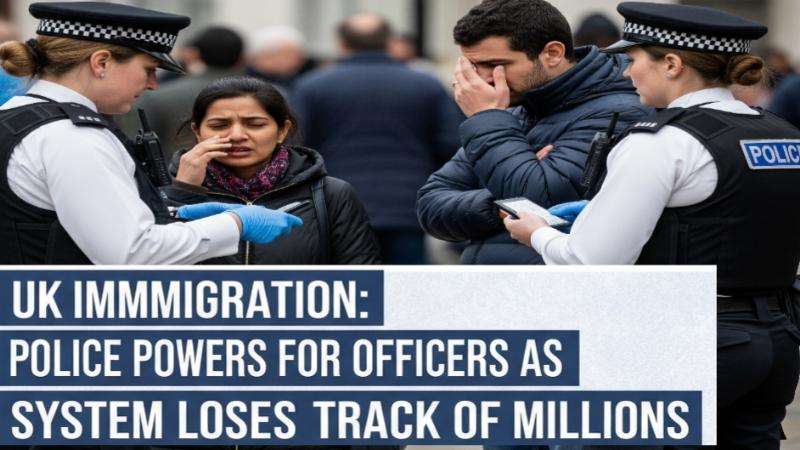In a significant escalation of its efforts to control migration, the UK Home Secretary has announced plans to grant immigration officers powers akin to those held by the police. This aggressive move, aimed squarely at illegal working, particularly among delivery drivers, follows a damning parliamentary report exposing the government's alarming failure to track over a million individuals who entered the UK on visas since 2020, along with widespread exploitation within the migrant workforce, Daily Dazzling Dawn understands.
However, this intensified crackdown and the relentless stream of new regulations are simultaneously generating profound anxiety within the UK's long-established legal immigrant communities, including British Bangladeshi, Pakistani, Indian, and broader BAME populations. Many fear that the aggressive rhetoric and ever-changing immigration landscape are creating a "hostile environment" that affects everyone, regardless of their legal status.
A System Adrift: Unchecked Entries and Pervasive Exploitation
Today's report from Parliament's Public Accounts Committee (PAC) reveals a critical flaw at the heart of the Home Office's oversight. Since 2020, approximately 1.2 million individuals have entered the UK on various visas, yet the PAC found that ministers have "never checked exit data." This stunning admission means the government has a significant blind spot regarding how many visa holders have overstayed their permissions or are working illegally, fundamentally undermining its claims of control over the immigration system.
The PAC's findings also paint a grim picture of exploitation, detailing instances of migrants enduring "excessive hours and exploitative conditions," particularly prevalent in the care sector. Despite the expansion of visa routes to address staff shortages, the Home Office is accused of being "slow and ineffective" in addressing issues like "debt bondage" among migrant workers.
Government's Hardline Response: More Powers, Broader Restrictions
In response to these systemic failures and mounting public pressure, the UK government is firmly doubling down on its hardline approach. The Home Secretary's intention to arm immigration officers with police-like powers, including expanded capabilities for searches and seizures, along with easier access to HMRC data for intelligence gathering, signals a significant commitment to more forceful enforcement. New "precursor" offences, similar to those in the Terrorism Act 2000, are also being considered for individuals involved in facilitating illegal immigration.
The government is also pursuing a comprehensive set of initiatives to "restore control over the immigration system" and significantly reduce net migration. A detailed Immigration White Paper, published in May 2025, outlines key reforms already in motion or slated for imminent implementation:
The minimum skill level for Skilled Worker visas is being raised to degree level from July 22, 2025, effectively removing over 100 occupations from eligibility and impacting sectors like hospitality, retail, and construction. General skilled worker salary thresholds will also increase from £38,700 to £41,700.
The care worker visa route for new overseas recruitment is set to cease from July 22, 2025, a significant departure from previous policies despite critical shortages in the sector. While in-country switching remains possible for existing visa holders until July 2028, employers are warned of increased scrutiny.
The standard qualifying period for Indefinite Leave to Remain (ILR), or permanent residency, is increasing from five to ten years, making the UK's path to settlement considerably more restrictive. The government has hinted at an "earned settlement" system based on contributions, though details remain unclear.
Tougher employer regulations are being introduced under the new Border Security, Asylum and Immigration Bill, which will mandate robust right-to-work checks for companies hiring gig economy and zero-hours workers. The immigration skills charge is also set to increase by 32%.
In terms of border security, the Border Security Command, established in July 2024 with a £75 million annual budget, is tasked with disrupting smuggling networks through advanced technology and expanded capabilities for the National Crime Agency. A first-of-its-kind sanctions regime targeting human traffickers has also been implemented.
Student visa restrictions are also being tightened, with the Graduate visa route for international students being shortened from two years to 18 months, accompanied by stricter pathways and English language requirements.
These policy shifts coincide with a reported 51% rise in arrests for illegal working since the recent election and commitments from major delivery companies like Deliveroo and Uber Eats to bolster rider verification checks.
Legal Immigrants Caught in the Crossfire: A Climate of Mounting Anxiety
While the government asserts these measures are essential for national security and economic stability, they are concurrently causing considerable distress within the UK's long-established and thriving immigrant communities. British Bangladeshi, Pakistani, Indian, and other BAME communities are expressing growing anxiety over the constantly shifting immigration landscape.
Many fear that the aggressive rhetoric and tightening of rules, ostensibly aimed at illegal immigrants, inadvertently cultivate a "hostile environment" that impacts all migrants. Legal residents and their families often find themselves navigating complex, ever-changing regulations that affect their ability to bring family members, extend visas, or secure their long-term future in the UK. The rising minimum income thresholds and extended residency periods for ILR directly impact families and individuals who have diligently built lives and contributed to British society for many years.
Community leaders and advocacy groups report a palpable sense of uncertainty and fear. There is a widespread concern that the singular focus on "cracking down" demonizes all migrants, blurring the lines between those who are here legally and those who are not. The closure of the care worker visa route, for instance, despite genuine demand for these roles, has particularly rattled communities that have traditionally filled such positions, highlighting the unpredictable nature of UK immigration policy.
The PAC's report underscores the Home Office's "little curiosity" about how the visa system actually functions. This perceived lack of understanding, coupled with a relentless push for stricter rules, leaves many legal immigrants feeling undervalued, insecure, and increasingly unwelcome in a country they call home.
As the UK government embarks on its most aggressive immigration reform campaign in recent history, the challenge will be not just to tackle illegal immigration, but to do so without alienating the millions of legal immigrants who are vital to the fabric and future of British society. The coming months will test the Home Office's ability to balance robust enforcement with the principles of fairness and clarity that many believe have been sorely lacking.


_4.jpg)





.svg)


